Let’s take a look at what children really need to know to be ready for kindergarten. It might not be what you expect!
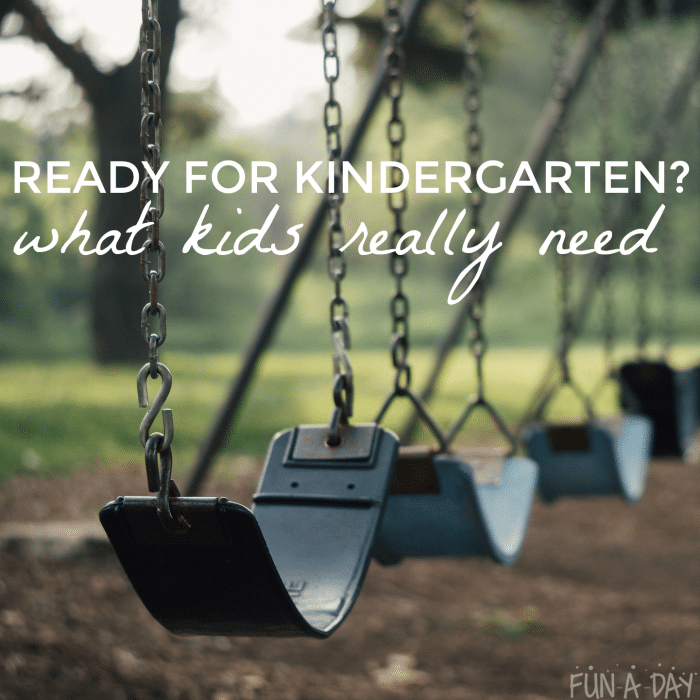
“Look, I found this checklist on the internet about everything my son needs to know before kindergarten. But I’m worried because he doesn’t know all of his letters and letter sounds.”
“The school my daughter’s going to did a test. They said she doesn’t know how to count to 30 and that might be a problem.”
“My kid’s elementary school sent us a letter about everything they have to know before they can go to kindergarten. I’m so confused. What does it mean?”
I’ve been asked some version of these questions many times, from friends, students’ parents, and readers. I have to admit, they make me furious. Not that I’m being asked the questions . . . I love that people come to me and want my opinion on kindergarten.
It’s the fact that such inaccurate information is given to parents that gets my blood boiling. Inevitably, these checklists, pre-kindergarten tests, and kindergarten expectation memos scare parents. Either that, or they cause a slew of remarks between parents comparing children and insinuating that somehow four- and five-year-olds are less if they don’t meet every item on the lists.
For those of you who’ve asked, I’ve included a free printable that contains the heart of this post. You can find it at the end.
Here’s a video synopsis:
Related: How We Talk About Kids Matters
Why Talk About Kindergarten Readiness?
Because of all the inaccurate and incomplete information floating around, I think it’s imperative that early childhood educators explain this topic (both to parents and the community at large).
“Kindergarten readiness” can sometimes be a hot topic full of unrealistic or incorrect expectations.
For example, it might surprise many people to know that a lot of the information on those ready for kindergarten checklists include items that are meant to be taught while kids are IN kindergarten. (Check your state’s kindergarten standards to see what I mean).
Sandi of Rubberboots and Elf Shoes (an awesome site that I follow) and I were chatting about this topic one day. Both of us being teachers, we got to talking about kindergarten readiness.
The result? A cross-grade, cross-border look at what children REALLY need to know before K — from a kindergarten teacher and a pre-k teacher (and former kindergarten teacher); a Canadian and an American.
Please note that getting ready for kindergarten is an incredibly important topic for me.
I’ve been involved in early childhood education since 2001, with experience teaching both kindergarten and pre-kindergarten.
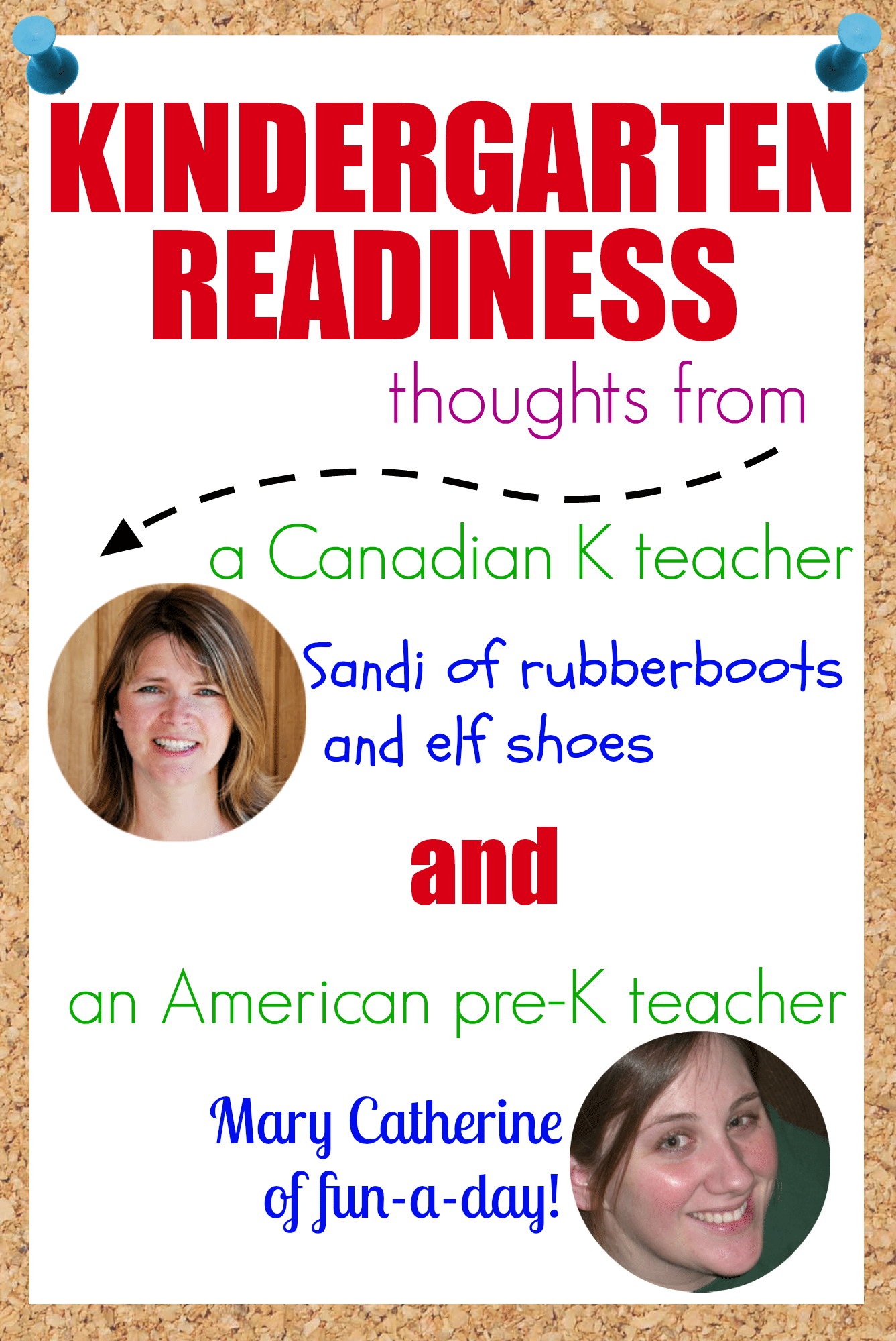
Related: Back-to-School Tips for Preschool Parents
Differing Schools of Thought
There are many opinions and schools of thought when it comes to kindergarten readiness.
On the one hand, some experts say that any child who is old enough should move onto kindergarten, regardless of other factors.
On the other hand, some experts say that a child needs to know a load of academic information before entering kindergarten.
Realistically, both extremes should be taken into account.
All in all, kindergarten readiness should be looked at from a realistic point of view.
This means taking into account how children are, how they learn, and what’s currently expected of children in kindergarten.
Children need to have the tools to start kindergarten in a positive way, as it sets the foundation for the rest of their school career.
While the purists may not always agree with this philosophy, a child’s development (in all areas) must be taken into account when considering kindergarten readiness.
What Kids REALLY Need to Be Ready for Kindergarten
I firmly believe that a child’s social, emotional, and behavioral readiness is exceedingly more important than what some assume to be academic readiness.
Below are what a child really needs before starting kindergarten:
Natural Curiosity
Most children are curious by nature, albeit in different ways. Some kiddos ask “why?” on repeat, while others quietly observe and collate.
As long as a child is interested in learning (in any form), she’ll be much more open to new experiences in kindergarten.
A love of learning takes children to so many new places and will help them start elementary school on the right foot!
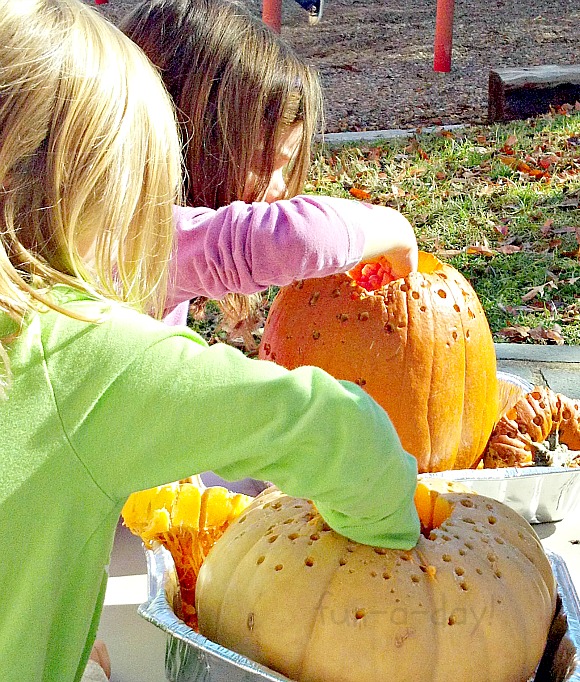
Related: Top 10 Science and Sensory Ideas for Kids
Fine Motor Skills
Children need to be practiced at small movements of their hands and fingers. Strengthening their fingers and hands helps with writing throughout elementary school.
Building with Lego, playing with play dough, and beading necklaces are some ways to strengthen children’s fine motor skills.

Related: Using Mini Erasers for Fine Motor and Math Skills
Self-Control
Young children are still developing their self-control in preschool and elementary school.
They don’t need to be perfectly in-control of themselves to go into kindergarten. However, they do need to be able to sit and listen to a story.
They also need to be able to quell some of their impulses (for example, the impulse to hit or push when mad).
Getting along, or at least trying to get along, with other children is important.
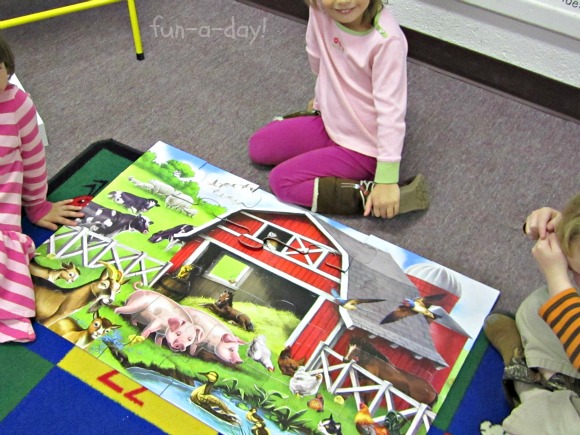
Related: How to Manage Free Choice Centers
Independence
Going into kindergarten, children need to be interested and active in becoming independent.
It’s important that they are willing to try new things, and they also need to do certain things on their own.
Some examples are zipping up backpacks, carrying their own lunchbox, and separating from their families.
Parents can help this by giving children more and more simple tasks to do on their own.
Giving children some time away from home (even in small increments) will also help with independence.
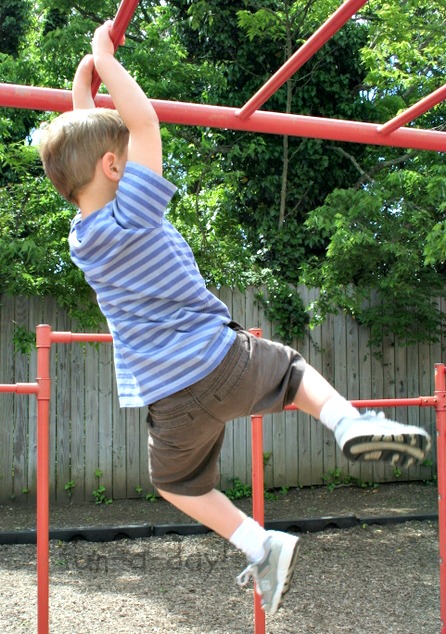
Self-Care Skills
Upcoming kindergartners should be well on their way to caring for their own bodies.
They should be able to dress and undress themselves, and they should be able to independently deal with the clothes they wear to school.
Bathroom skills are of the utmost importance!
K kiddos must be able to use the restroom themselves, wipe themselves, and wash their hands. I cannot stress how important these skills are!!
Confidence
I’m not referring to how outgoing a child is when I refer to confidence.
Shyer, quieter children who are confident in their abilities are just as ready for kindergarten as more extroverted children.
No matter their temperament, children going into kindergarten should know that they can try new things on their own.
They should understand that they can do their best while away from their parents.
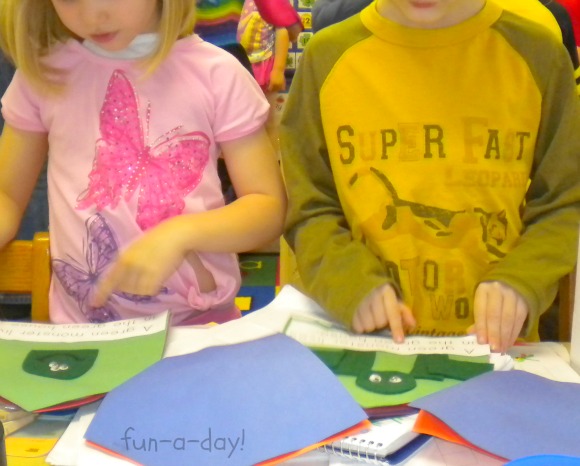
But What About Academics?
You’ll notice I haven’t listed any academic skills thus far.
I don’t agree with all the checklists floating around that say children need to practically be reading prior to kindergarten.
Yes, sometimes kids are reading before kindergarten, and that’s great, but it is not necessary!
Upcoming kindergartners should have some basic knowledge of the alphabet, especially when it comes to the letters in their names.
Being able to count and identify numerals up to 10 is a great start, as well.
A good foundation for mathematical concepts like shapes, colors, and sorting is also helpful.
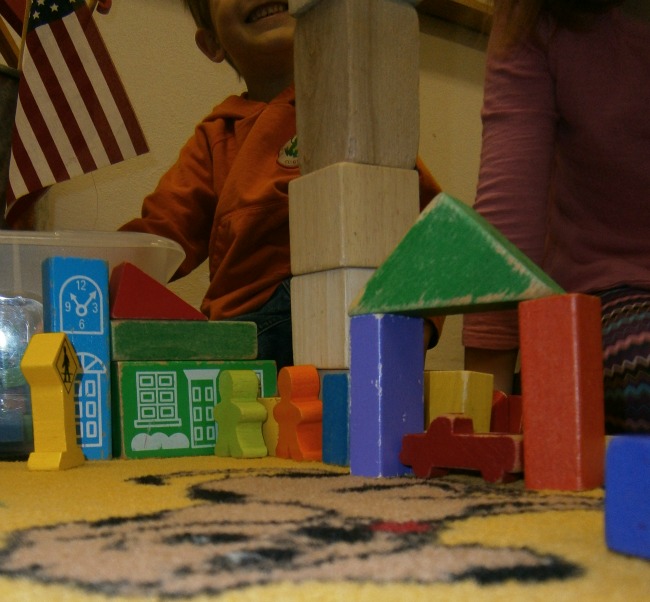
I cannot stress enough that academic readiness is only one small part of being ready for kindergarten!
I would suggest that you get a hold of the kindergarten standards of learning for your state.
They will tell you what your child needs to know by the end of kindergarten.
Now hop on over to Rubberboots and Elf Shoes to read what Sandi, and her kindergartners, have to say about getting ready for kindergarten!
More Resources About Kindergarten Readiness
Deborah of Teach Preschool‘s book Ready for Kindergarten
No Time for Flash Cards’ Why I’m Ditching the Kindergarten Checklist
How Wee Learn’s Learning Naturally
Get Ready for K Through Play Pinterest Board
Grab a Free Printable of This Post
I made a simple handout to go along with this post, at the request of some of you awesome readers. It’s a simple rendition of this post, edited down to two pages so you can print double-sided for a one page handout.
The free printable is available to members of Fun-A-Day’s email community. If you’re already a member, enter your email in the form below to have it sent to your inbox.
If you’re not a member, that’s okay! You can join us by entering your information in the form below. Then you’ll get the printable handout as a welcome gift.
You can also access the form in a new tab if you’d prefer.
The Best Thing We Can Give our Children is our Time
The best way to prepare children for anything in life, including kindergarten, is by investing in them. I think the best investment we can give them at this age is our time. As both parents and children get older, both will cherish the time spent playing together. And I’m a firm believer in the many, many benefits of play in childhood. So, if you really want to prepare your children for kindergarten, play with them!
But it can be difficult to bring out our inner-child to play with our actual child. That’s why I’ve created this list of some things that your kids will love playing with you. Check it out below!
I may get commissions for purchases made through links in this post.
- Build with blocks
- Play with toy vehicles
- Pretend play with various play sets
- Play dress up with costumes and masks
- Work a puzzle
- Play age-appropriate games with the whole family
- Bounce, throw, and kick playground balls back and forth
- Play tag
- Color in coloring books or draw pictures
- Read stories
- Draw with sidewalk chalk
- Create crafts
- Let your child decide!
This list just brushes the tip of the iceberg when it comes to playing with your kids. But no matter what you do, just follow your child’s lead and the two of you are sure to have a blast!
Remember – your child will cherish any time you spend with them. And it will be even more special when you’re investing in them and doing something they love. So don’t worry about embarrassing yourself or looking silly. Just PLAY! In my book, the sillier – the better!
Resources for Early Childhood Educators
If you’re a preschool teacher and are looking to save some time (and, really, who isn’t?!) I’d like to invite you to poke around Preschool Teacher 101. We’ve got a variety of member resources for early childhood educators over there, as well as individual plans and ideas.
Originally published on August 13, 2013.
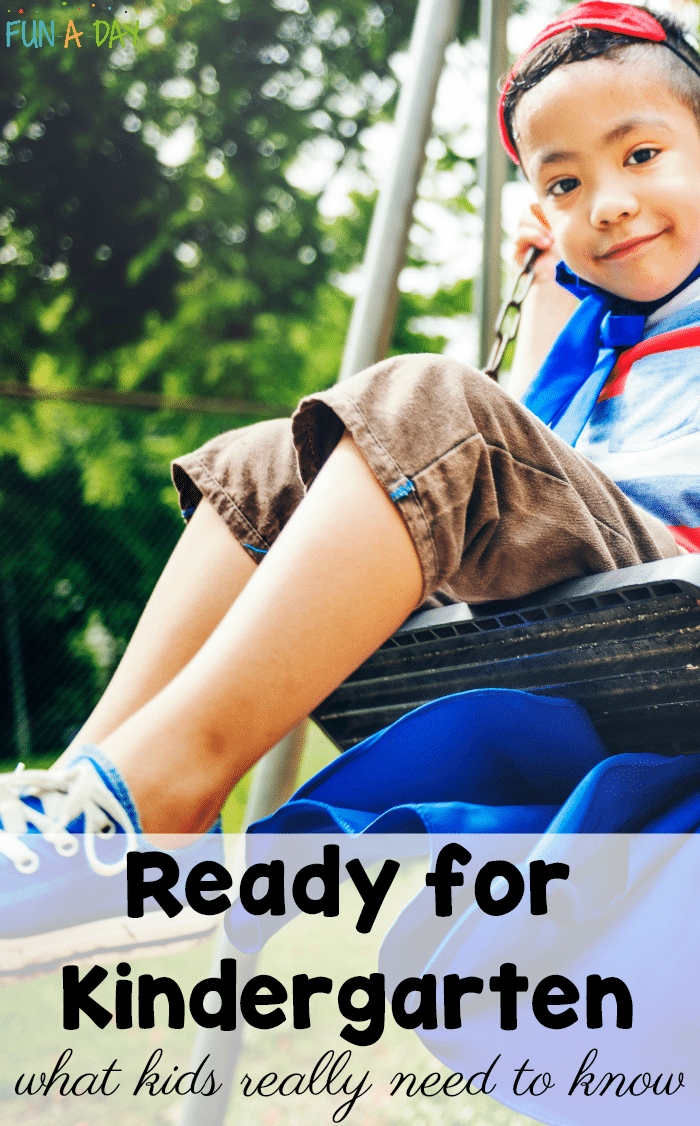
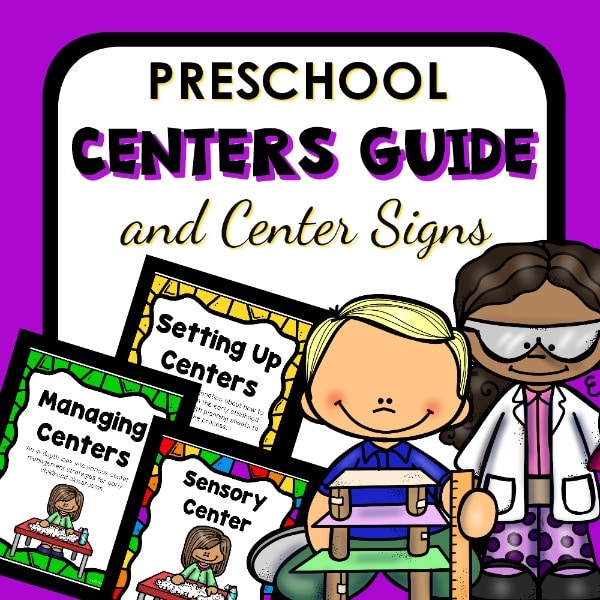
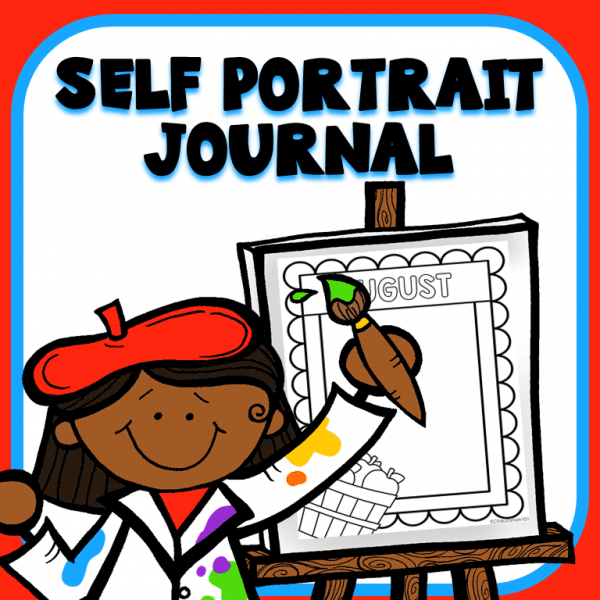
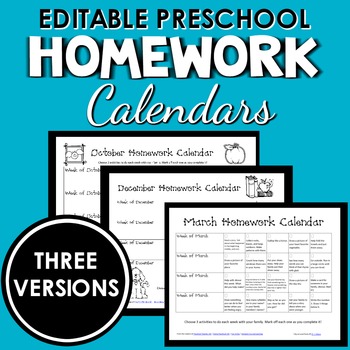
I followed you from Rubber Boots and elf Shoes and have enjoyed reading what you ladies had to say. I agree whole heartedly with you both…from an Australian perspective. I have been teaching Kindergarten for eleven years and still love it.
Trusting your start up is smooth with that certain twinkle we all look for.
Julie 🙂
Thank you so much for popping by, Julie!! I absolutely adore the pre-k and k age group too. Love it — so far we have an Australian, a Canadian, and an American input! Let’s see what other countries we can hear from! 🙂
So….. the Algebra I’ve been working on with my 4 year old is unnecessary? 🙂 I love this list, and love that you just focused on basic skills for kids. I especially like the confidence point, because that sort of sums it all up if kids are given the opportunities to work on the rest of your skills.
Hahahaha, Jeanette . . . love it! 🙂 Thanks so much for your kind words. 🙂 I really do think curiosity and confidence are what it all boils down to! PS – Let me know how that algebra is coming along. 😉
I love how you boil down kindergarten readiness to 2 words: curiosity and confidence. And then we can offer environments that enable children to practice being curious and confident, and revel in the learning that results.
Thanks, Sandi! I firmly believe that to be true! What a good point you make about us offering environments that help nourish curiosity and confidence!!
Woohoo…the kid is in bed and I finally had a chance to sit down and read this! I love, love, love your take on kindergarten readiness. I’m so happy you wrote this right now, as I’m starting to figure out what homeschooling preschool is going to look like, and I’m going to use your suggestions here as a guide on what to focus on. At the same time, it was reassuring to recognize a lot of my own kid in what you’ve said! There are things we’ll have to work on, though, and it’s so good to know what they are. Thank you for sharing your expertise with all of us!
Thanks so much, Jessica! I’m excited to hear how your homeschooling year goes with Little Engineer. I really wanted this to be a helpful guide for parents, so your words me a lot. 🙂
I read your post with interest – as someone who comes from a long line of professional teachers, and one who homeschools. I appreciated your post, but want to share my perspective, with your permission:
Your list is very similar to the one that our public schools mailed out this year. It seems very appropriate for those who plan to enroll their child in an institutional setting, but has little to do with what I see as important in kindergarten. I respect that in an institutional setting, a teacher may simply be unable to help a child tie a shoe, or zip a coat – but is that *really* what kindergarten is all about? Or is it simply a matter of ease of classroom management for the teacher?
In our school district, for a borderline birthday, a child who can read & do math on a third grade level can still be rejected for kindergarten because of an inability to take care of zipping her own coat – are the schools here focusing on educating the child, or simply on making the teacher’s day more bearable?
For my homeschooled daughter, I see her religious & academic maturity as the most important “readiness” things in school. I see obedience and relationship-building as much more important values than “independence.” I see separating from parents as something to be focused on as a young person approaches the age to actually be independent (married, employed) – rather than when they simply become dependent upon a *different* adult from their parents. After all, no one is suggesting that a kindergartener *truly* be independent when they use that word – it would be a crime (at least in the US) to make a five year old truly “independent.”
I can easily see a situation in which a child might be very “ready” for kindergarten according to your list – he can zip his coat, use the potty without help, play well with others, etc – but still finish grade school without learning to read or do basic math. I have known many such children.
I’m not sure that we do our children the greatest service by focusing exclusively on social conformity & self sufficiency to establish readiness, rather than the academic prerequisites for learning.
Anna, thank you very much for your thoughtful opinion. I’m always welcome to other perspectives! I don’t think social conformity and self-sufficiency are what kindergarten is all about. However, I do see an attempt at independence a good groundwork for being ready to learn in school. From a teacher’s perspective, it never occurred to me to consider easing my work day. I was thinking of the children and their needs throughout the school day. Being able to take care of their own bathroom needs, for example, means they don’t become stressed when they cannot get their pants buttoned.
I was hoping to make the point that children going into kindergarten don’t need to meet a long list of academic requirements to be ready. In my personal (and professional) opinion, there’s been too much of a focus on only academics by some. Having the fundamentals prior to entering K is wonderful — exposure to letters, letter sounds, counting, colors, thinking about stories, listening to books, playing rhyming games, etc.
While, yes, a child who is ready by my standards might finish elementary school without the basics. It is a very sad fact that this occurs. There are usually many other contributing factors in such a case, though. I have actually seen more children with the opposite situation — they are academically, but have no confidence, won’t attempt tasks on their own, and have an amazing amount of emotional hurt being away from their families — and they have left elementary school without the same such basics.
No matter our differing opinions, it sounds like your daughter has a very loving teacher in her mama. I’m sure she is receiving a great education at your hands. Thank you again for stopping by and sharing your thoughts.
Thanks for posting this! As a parent of a boy with a very late summer birthday, this is certainly a decision our family will be faced with over the next several months. I am also a former primary {kindergarten, 1st & 2nd} teacher, and I 100% agree with the curiosity & confidence guidelines. I also want to voice that there is nothing “wrong” with postponing kindergarten to allow a child additional time to develop necessary social & personal skills. Love your blog!
Thanks so much for stopping, Kimberly! I completely agree — there is nothing wrong on postponing kindergarten for the right reasons!!! I think being sure a child is ready emotionally is of huge importance!
This is such an amazing post, Mary Catherine, and I’m so glad you shared it at Discover and Explore. You’ve just given me one more post to add to my list of all-time Fun-A-Day faves!
Thank you, Stephanie!! 🙂 I am (obviously) very passionate about this! You’re way too sweet, lady. Thanks for hosting Discover and Explore — it’s always great to read what others have going on within the same topic.
Such great information coming from a teacher! Thanks for sharing at the After School Linky, Mary Catherine!
Thanks so much, Anna! 🙂
Thank you for this post! With all the checklists for academic skills 5 year olds should have (from knowing the alphabet to reading!) it’s nice to read a common sense list that focuses on being ready for learning, rather than what they “need” to know. My daughter will be going to kindergarten in the fall and can’t write her name. She’s getting there, she’s interested in learning, but all kids are different and it’s important for parents to remember that as they get their child ready for the “Big K”, 🙂
I so appreciate your kind words, Emma! I really believe it’s being ready for the learning, rather than the academic skills, that’s important. Looking at your state’s kindergarten standards (what kids should know at the END of kindergarten) is a good place to start if you’re interested in what skills will be taught. It sounds like your daughter is gearing up!!! Having a mama with reasonable expectations and understanding is a big help, I’m sure.
Realmente me emociona saber que hay educadores que se comprometen tanto en esta labor, leo y comparto todas tus experiencias y reflexiones, soy de Chile , trabajo con preescolar hace 5 años… esto me llena cada día mas…saludos natalia!!!!
Thank you so much for those amazingly kind words!
I have been teaching the Primary Montessori class for over 8 yrs now and I definitely agree with you about the children overcoming the hurdles of fear, and becoming more curious and confident before going to KG. I have stressed over and over again to parents that once their child is socially stable they will love to learn the academics and will fly with it, but parents refuse to understand and just want to push their children into the academics even before they are fully confident and socially stable. Thank you for this wonderful post.
Thanks for taking the time to share your thoughts and experiences. I agree that we, as early childhood educators, need to do our best to educate parents about child development and best practice. There is just too much incorrect information floating around out there scaring parents into thinking preschool children are behind.
I am an early childhood/4K teacher, and I completely agree with you on this! I took a class this summer on the importance of movement and play with young children. Brain connections become stronger when children move and play and have the freedom of choice in their play. Some children in 4K are ready to read, but I would never force it! Pushing all academics is not good for young children, and can actually do more harm than good. We now have brain research to back that up!
Thanks so much for joining the conversation, Michele! Yes, I completely agree with what you said . . . all backed up by research, too.
Thank you!
You’re welcome!
I am a retired K teacher. I taught K for 25 years. Prior to K (in public schools)I taught various primary grades in Lutheran schools. When I started K in 1990 the expectations for what K kids needed to know by the end of K were totally different from what Ks should know by the in of K in 2015. K curriculum in California now is what 1st grade. Pre School curriculum is now what used to be K. If a K student did not go to preschool they are already behind in learning how to read. If their parents don’t speak English they do not have any one to help with academic homework .
Hi Janet, your comment was sent to spam accidentally, so I’m just seeing it now. My very first teaching position was teaching kindergarten in California! Even then, back in 2001, many aspects of kindergarten were more aligned with first grade. While I appreciate your input here, I’m going to respectfully disagree that children who didn’t attend preschool are behind on learning to read. I do agree that the language barrier is an issue that affects many children in the US. My biggest issue is that I think this is all a case of adults making poor decisions that adversely affect kids. We can ensure that standards are developmentally appropriate, etc. Really, these issues would take a lot longer to list, right?